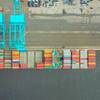Transnet to Cut Transport of Non-Essential Cargo During Lockdown
South Africa's logistics firm Transnet said it would reduce transport services and non-essential cargo operations during a nationwide lockdown that began at midnight on Thursday to contain the coronavirus.
The state-owned company said shipments of metals and minerals would depend on demand and government approval. It was unclear if these exports would be affected.
The transport of coal to state-run utility Eskom's power stations would continue, Transnet said.
Transnet operates nearly three quarters of the African rail network, the bulk of which is in South Africa.
It said it had decided to close all automotive terminals and multi-purpose terminals at the ports of East London, Saldanha, Port Elizabeth and Maydon Wharf in Durban.
"Transnet has taken a decision to reduce staff in some of the terminals with the exception of operations for Agri-bulk products namely; soya bean meal, fertiliser and woodchips, which will be serviced on single berths operation at East-London, Richards Bay and Durban Agri terminals," Transnet said in a statement.
All bulk cargo terminals, which handle mineral mining commodities, will operate on schedules as per demand from mining customers, subject to approval by the Department of Public Enterprises and Department of Mineral Resources, the logistics firm said.
South Africa's Kumba Iron Ore, a unit of Anglo American, said on Friday it would maintain its rail and port logistics infrastructure to support the export of iron ore which it expected to continue.
Eskom generates more than 90% of South Africa's electricity, most of which is from its coal-fired power plants.
The 21-day nationwide lockdown came into force at midnight on Thursday and largely confines people to their homes except for specific outings such as to buy food or for health emergencies.
Africa's most industrialised economy reported its first two deaths from the coronavirus on Thursday and a sharp jump in new infections to more than 1,000.
(Reporting by Tanisha Heiberg; Editing by Mark Potter and Susan Fenton)















